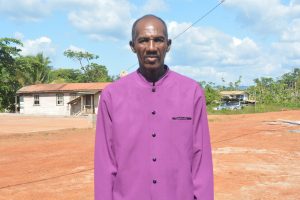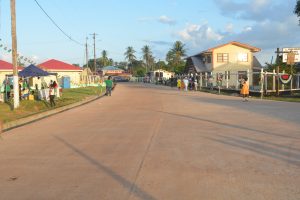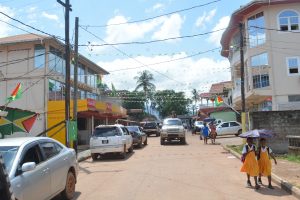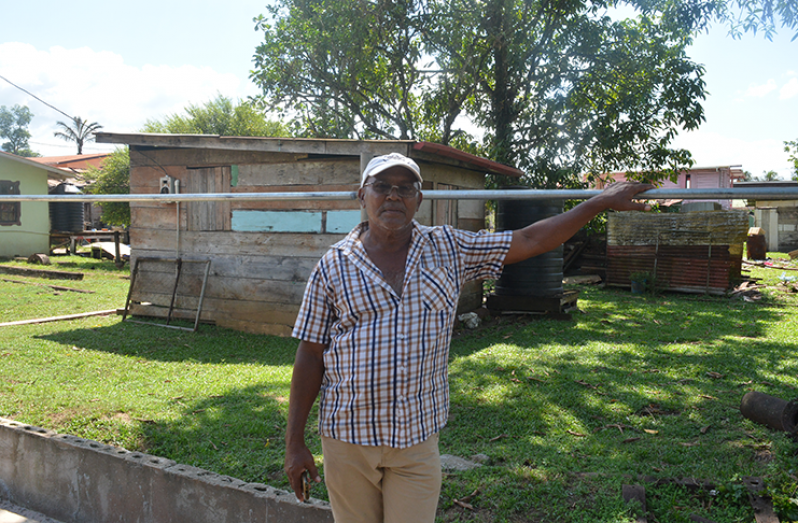– say residents of Mahdia, Guyana’s newest town
RESIDENTS, though appreciative of the move by the A Partnership for National Unity+Alliance For Change (APNU+AFC) government to bestow township status on Mahdia, said much more needs to be done to address the deficiencies within the health, education, social services and public infrastructure sectors there.
Forty-six-year-old Nigel Gordon, a resident of Mahdia for 32 years, said there is no doubt that Mahdia has undergone various stages of development over the years as he reflected on the days when the mining hub was sparsely populated with a few buildings.
Gordon told the Guyana Chronicle that the declaration of Mahdia as a town by President David Granger came at a time when residents were no longer walking on earthen roads, as he pointed to the recently completed $827M concrete internal road network.

The businessman and father of six said while the main road network has been upgraded, many of the minor streets within the town are in deplorable condition and require fixing.
“Where I am living, there is the nursery school at the entrance, there is a teachers’ compound in the street, and the road is very bad,” he pointed out.
In the area of education, Gordon contended that while the infrastructure is in place, the nursery, primary and secondary schools lack trained teachers.
“There is a secondary school here but it needs more trained teachers,” he posited, while contending that because of the “lack of trained teachers”, he transferred three of his children to schools in the city so as to guarantee them better education.
Sixty-one-year-old Vincent Xavier, who was born and bred in Mahdia, said while he has always known Mahdia to have the basic amenities such as schools, hospital, clinic and police station, they lack capacity.
“We have the facilities, but then again we don’t have the teachers; many of the teachers are not trained,” he contended as well.
According to him at the end of the last academic year, approximately 84 children graduated from the nursery school; but the primary school at the start of the new academic year could have only accommodated 44 of those children. The remaining 40 children were reportedly placed in private schools.
However, Mahdia Secondary School with an enrolment of approximately 356 students, has approximately 11 teachers on staff, while two are attending the University of Guyana and Cyril Potter College of Education (CPCE) in Region Four.
Xavier said in the case of the Mahdia District Hospital, it lacks trained technicians as he complained about not being able to access the required services.
“For instance, I am coming from the hospital right now; we have so much equipment but we don’t have the technician, and you still have to go to Georgetown to have your x-ray and other tests done; and we have the equipment here, but we don’t have the technicians,” he complained.
BIG CHALLENGE
He said this is a concern the Public Health Ministry should look into. The 61-year-old man said the inability to access potable water and electricity on a 24-hour basis remains the biggest problem for residents of Mahdia.

“We don’t have current 24 hours, we don’t have water. I personally get water every three to four months, is rain water I does depend on…. If rain don’t fall we don’t get water; at least I don’t get, some people don’t get either,” Xavier said.
Potable water is supplied to parts of the town from the Salbora Reservoir, while approximately 18 hours of electricity is supplied to residents there on a daily basis by Mahdia Power and Light Incorporated.
For 84-year-old Geris Carler, who moved to Mahdia with her family when she was just eight years old, the lack of employment is a major concern that Mahdia grapples with as it becomes a town.
Alluding to fact that residents there depend heavily on gold mining, Carler said the livelihoods of small miners have been threatened by the “invasion” of medium and large-scale miners into the industry.
Carler, who was forced out of the industry approximately 12 years ago when she was given a cease order on the property she had owned for 19 years, said small-scale miners are now finding it difficult to mine – a situation which she says has taken a toll on the town’s economy.
Fifty-eight-year-old Pastor Michael Matheson, who was born in Mahdia, echoed those sentiments. “When you not getting to mine in the area, it is very hard, because that is mainly what we are surviving on. You don’t have any sawmill that people could go and do any kind of work or any other thing except with the government people,” he posited.
THINGS HAPPENING
However, Matheson said he is pleased with the infrastructural development taking place in the town. “I really please with the development, the place was very dusty, but now we have concrete road; but there is still some things to be done, so the infrastructure is developing and I am glad about this,” he said.
Unlike the views of Gordon and Xavier, Matheson believes that the education and health sectors within the town are performing to expectations. “We have seen improvements in the hospital, we have doctors, at one time it was medex or dispenser; but now we have

more than one doctor,” he posited.
Despite the challenges facing Mahdia, Roger Hinds, one of Mahdia’s most prominent and influential businessmen, said Mahdia has made great strides and will continue to experience development in key sectors.
“As we improve to offer other services such as banking services, we will continue to progress towards becoming a vibrant commercial hub,” Hinds said, as he addressed hundreds of residents during the declaration ceremony last Thursday.
The Region Eight Chairman Bonaventure Fredericks said though many have criticised the move by government to update the status of Mahdia, he is of the belief that it is a positive step to greater things. He called on residents to be patient, noting that they should work together to raise the standard of the town.




.jpg)










